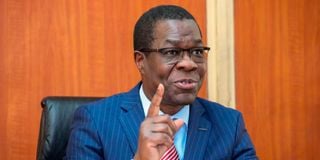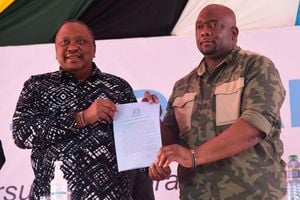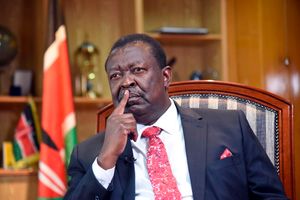
Leader of Minority in the National Assembly Opiyo Wandayi.
Kenyan authorities are fighting fires to stem a diplomatic quarrel after Nairobi allowed an exiled and sanctioned Congolese politician to announce a political-military alliance targeting to unseat his home government.
And although the incident has been disowned by top government officials, including President William Ruto, opposition leaders in Kenya say the timing of the announcement was a potential red alert for the Democratic Republic of Congo which heads to the elections on Wednesday.
Opiyo Wandayi, the Leader of Minority and legislator for Ugunja Constituency, Siaya County, in the west of the country, accused the government of allowing an incendiary amid tense elections in the DRC.
“We find it extremely disturbing that while DRC is planning to hold elections, Kenya would allow well-known Congolese rebels and armed militants to announce the launch a political-military alliance to destabilise DRC,” he told Nation.Africa on Tuesday.
“We call on the regional states to be careful and to remain alert. We are concerned that the Kenya Kwanza (President Ruto’s ruling coalition) regime could slowly be becoming part of the global network of nations, individuals and institutions with an extortionist and extractionist mindset and who thrive in chaos,” said Mr Wandayi who also represents opposition Orange Democratic Movement, a member of the Azimio la Umoja coalition in the opposition.
Wandayi, an ally of ODM leader Raila Odinga, spoke after a press conference last week on Friday in which M23 rebel leader Bertrand Bisimiwa, and former election chief Mr Corneille Nangaa, publicly launched in Nairobi, the Congo River Alliance, a political-military alliance whose objective is to dethrone DRC President Felix Tshisekedi regime.
President Tshisekedi is competing against 21 other candidates to be the next President of the DRC but he already launched a protest, accusing Kenya of being complicit in a plan to dismember his country.
Kinshasa summoned Kenya’s ambassador, and recalled its envoys in Nairobi and Arusha at the headquarters of the East African Community (EAC) for “consultations”.
President Ruto on Sunday night told a joint TV interview with Kenyan stations that the government had no role in the announcement even though he admitted rejecting a request from Kinshasa to arrest the rebel leaders.
Kenya’s Prime Cabinet Secretary and Foreign Affairs Cabinet Secretary Musalia Mudavadi had said on Sunday that the government “strongly disassociates” with a Congolese opposition figure who forged an alliance with the rebels.
“Kenya strongly disassociates itself from any utterances or activities likely to injure the peace and security of the friendly nation of DRC,” Mr Mudavadi said in a statement.
Kenya’s former President Uhuru Kenyatta, the Facilitator of the East African Community-led peace process, known as the Nairobi Process, condemned the alliance. And so has his political ally and leader of Azimio coalition Mr Odinga.
“The Facilitator repudiates these developments and in particular their military character and the accompanying politically charged and provocative rhetoric,” said Mr Kenyatta.
Mr Nangaa announced on Friday last week at Serena hotel in Nairobi that he was creating a political-military alliance with M23 rebels and other armed groups.
The US government has been keen on a long-lasting peace in DRC. The US National Security Council (NSC) Spokesperson Adrienne Watson said on Friday that her country will use its intelligence and diplomatic resources to monitor the activities of the armed forces and non-state armed groups, after pressuring parties to a 14-day ceasefire last week.
Ms Watson further noted that the US supports the resumption of the Nairobi and Luanda processes, which seek to address “the current historic factors perpetuating this longstanding crisis.”
The two processes are part of a regionally supported dialogue programme to convince warring groups to lay down their arms.
But as before, Congolese elections seem to be raising political divisions in faraway Kenya. Mr Bisimiwa is the head of M23 rebel group, whose war with FARDC, and the FDLR, remnants of genocidaires in Rwanda, have ensured perennial instability Eastern DRC, even though there are about 120 other armed groups in the region.
Mr Nangaa, full name Corneille Yobeluo Nangaa, an opposition politician in DRC, is the former President country’s electoral commission and has been exiled to Kenya.
In March 2019, he and other officials of the Independent National Electoral Commission (CENI) were sanctioned by the US Treasury for actions that “obstruct and delay preparations for credible and inclusive elections” at the time.
Others included CENI Vice-President Norbert Basengezi Katintima and his son Marcellin Basengezi Mukolo (Basengezi), a high-level CENI advisor. Their assets in the US were frozen and American entities barred from dealing with them.
The pact came just as the Kenyan troops, a part of the East African Community Regional Force (EACRF), exited the DRC after end of their mandate on December 8.
While there, EACRF was accused by Kinshasa of failing to attack M23 group. EACRF also included troops from Uganda, Burundi and South.
During a media interview at State House, Nairobi, President Ruto said he declined to arrest the leaders because they were free to speak.
“We don’t arrest people who have made a statement. We arrest criminals,” said President Ruto adding; “If anyone has committed any criminality, we will go out of our way to deal with them.”
The M23 rebel group has been fighting Congolese forces, FARDC, and allied militia in renewed violence since October.
In Kenya, the opposition wants the government to come clean on whether it is interfering in the polls in the DRC.
“The Ministry of Foreign Affairs has offered no convincing explanation while the Ministry of Interior seems to see no danger in what happened. We do not believe the explanation the government of Kenya gave that it did not know what the rebels were doing,” Wandayi said.
“Being in a political asylum, Nangaa was automatically on the radar of the government security agencies, unless the Nairobi regime was extremely careless. For him and Bisimiwa to announce the formation of a military movement in a public place like the Serena Hotel, they must have known that he has protection in high places,” said Mr Wandayi.







